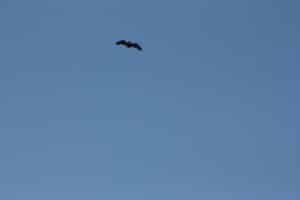- 08/05/2013
- Posted by: Joyce Watson MS
- Categories: Blog, Feature

 This photograph is, I think, of a greater horse-shoe bat. I took it at Bosherton Lily Ponds on Sunday the 21st April 2013. It was half past three in the afternoon and the sun was shining brightly.
This photograph is, I think, of a greater horse-shoe bat. I took it at Bosherton Lily Ponds on Sunday the 21st April 2013. It was half past three in the afternoon and the sun was shining brightly.
I am a keen walker and photographer, as is my husband, Wally. At the time, we were waiting to see a woodpecker return to the hole it had made. What a surprise we had when this turned up. I am no expert on bats but I am very pleased with this photograph. What I would like is if someone could tell me more about what we saw.
As well as bats, with the springing of spring (at last!), I have been thinking about bees (this is not going to be an awkward conversation about ‘the bats and the bees’ – like Mr Stevens’ talk with Hugh Grant in The Remains of the Day).
Most of us have heard that there is great concern across Europe about the collapse of bee populations. The European Commission recently voted to restrict the use of pesticides linked to bee deaths by researchers. The UK government opposed the decision but is bound by it anyway.
Here in Wales, I am pleased that the Welsh Government has launched a plan to increase the numbers of bees and other pollinators in Wales.
Just as the fact that I have taken a photograph of a bat does not make me an expert on bats, I am no expert on bees either. But I am interested. Recently, I was pulling up dandelions in my garden. My daughter told me to leave at least one because, she explained, bees delve deeply into the yellow flower of the dandelion and they are important in pollinating. I had no idea but the more I come into contact with the natural world around us the more I realise how inter-linked we all are on our Planet.
In the Welsh Assembly I have learned that 20% of the UK cropped area is made up of pollinator dependent crops. The decline in pollinators poses a real threat to Wales’ wildlife and could have a serious effect on our ability to produce food. Estimates put the value of pollinators to the UK at over £430 million per annum. Everyone is agreed that they provide a vital ecosystem service.
Pembrokeshire is a key battleground in the bees’ fight-back. The Beekeepers’ Association has been developing a specific strain of Pembrokeshire bee, which is more resistant to damp weather and disease. Last year grants totalling nearly £48,000 were awarded to the new beekeeping centre at Scolton Manor, near Haverfordwest, which is already helping to educate the public about bees and keeping the creatures.

